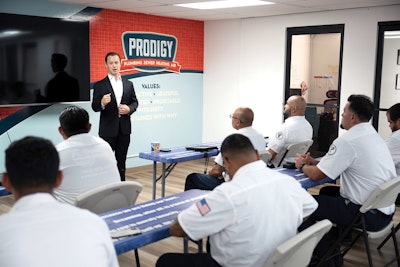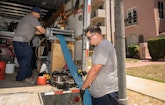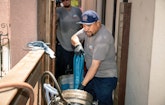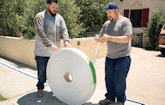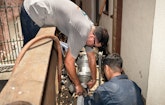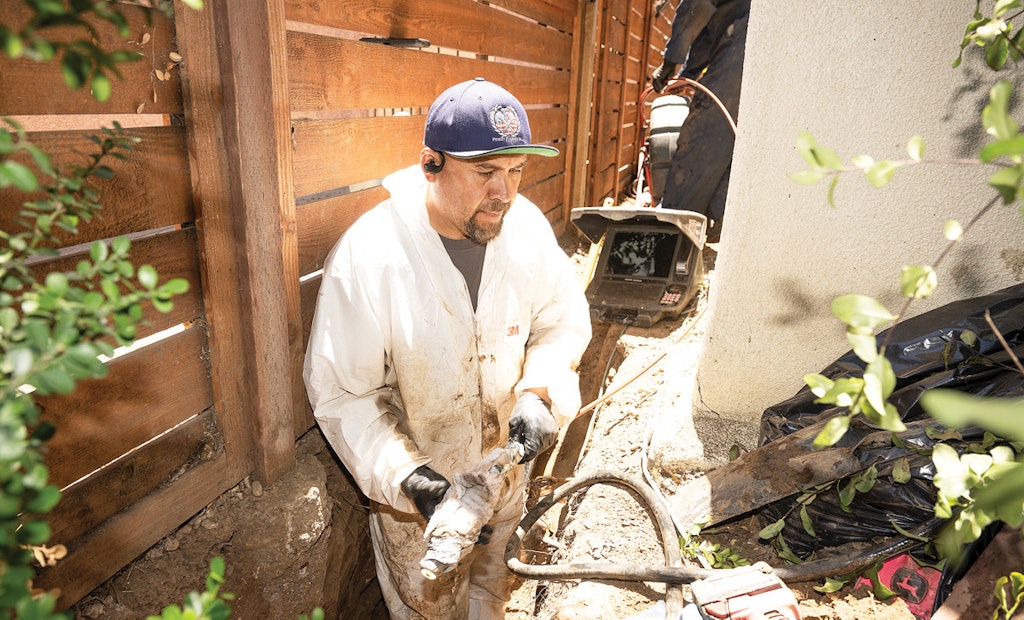Interested in Relining/Rehab?
Get Relining/Rehab articles, news and videos right in your inbox! Sign up now.
Relining/Rehab + Get AlertsWhen Mark Ellefson decided to call his company Prodigy Plumbing, he knew he’d raised the bar high and would have to provide the kind of exceptional service implied by the name.
So far, so good.
“My mission from day one was to live up to that name,” says Ellefson, who founded the Long Beach, California-based company in 2010. “And I’ve totally done that.”
The numbers certainly reflect his aspirations. The company — which does drain cleaning, trenchless pipe rehab and plumbing — has grown to 30 employees, including more than 20 technicians, and runs about 20 service vehicles. It owns an impressive roster of equipment required to provide diverse services.
And perhaps most telling of all, the company is on pace to generate more than $6 million in sales revenue this year, compared to $4.5 million in 2021, says Ellefson, 37.
“We operate a certain way and achieve certain results.”
The key to such success includes significant investments in equipment and technology that amp up efficiency and profitability; a business coach; a strong emphasis on obtaining online reviews (505 on Google and 1,328 on Yelp, and counting); and a Zen-like approach to business that creates a corporate culture that fosters employee retention.
“When I was a rock-and-roll musician, I developed some bad habits — a bad lifestyle,” Ellefson candidly relates about his previous foray into punk rock. “I went through a rock-bottom thing and personal development was the only way out of it.
“I changed my belief system and mindset to create a different life for myself in my early 20s — created massive change for the better. And I figure if I could do that for myself, I can do it for my employees, too. I want to share that wisdom and power.”
Ellefson concedes the spiritual approach isn’t for everyone.
“I’ve had guys leave because they weren’t in it for the Prodigy big picture, where we show people compassion, love and true, genuine support,” he explains. “But the guys that stay are true believers. … They see other guys buy into it and make boatloads of money because of their attitude and energy. They become better husbands and fathers at home.
“It’s a very tangible and powerful thing.”
Back to school
To help cultivate the type of corporate culture he desired, Ellefson hired a business coach for a year. The coach taught employees about the seven habits of highly effective people (based on the best-selling book by the same name, written by Stephen Covey and published in 1989).
Employees attended weekly, half-hour-long workshops, followed by individual sessions if needed, says Ellefson, who got into plumbing by taking a one-year course at a trade school in Long Beach in 2005.
“It was worth doing it for our guys,” he says, noting that Fortune 500 companies do the same thing. “This is how we change the standards of the industry.
“Every plumber I talk to about this says, ‘Who does this?!’ And I say, ‘We do.’ We’re successful because we think differently. Just because we’re plumbers doesn’t mean we can’t think at a higher level. If you’re not growing, you’re moving backwards.”
Customer-centric mindset
Ellefson always moved forward in his career, working for several plumbing companies — both big and small — before getting laid off and starting Prodigy.
“A friend of mine said I should start my own business,” he recalls. “I didn’t know anything about running a business. But plumbing was the only thing I knew how to do, so I went out and did it.”
Ellefson’s top priorities were treating people well and paying them well.
“This can be a negative and toxic industry, full of stereotypes,” he notes. “That’s not what I’m about. If I’m going to shine and be a prodigy, I have to live by certain values and enforce them for anyone who want to work with me — things like be positive, be nice to each other, have integrity and over-deliver when it comes to customer service.”
Regarding the latter, it’s not only the right thing to do; it also leads to word-of-mouth referrals. When his technicians install a new faucet and leave an undersink cabinet cleaner and more organized than it was before, for example, it makes a big impression on customers.
“It blows people away,” Ellefson says. “Things like that only take a few minutes and they don’t cost us anything. And customers see we care about them and tell their family and friends about us.
“You don’t have to spend a million dollars and market your company to a million people. All those little things make an impact and motivate people to refer you to other people and keep calling you forever.”
Low-cost marketing
Ellefson says he devotes only about 3% of his company’s budget to marketing, yet still generates a large return on investment. For example, he says 84% of Prodigy’s revenue comes from repeat customers and his company has dominated the local market for the last eight years.
“We try to avoid killing our guys with work and having them burn out,” he says, explaining the relatively low level of marketing expenditures. “So if we spend less on marketing, we can pay our guys more and keep them happy, which keeps our existing clients happy and also helps us maintain job quality.”
Online reviews, which are low-cost and very effective, have been critical to the company’s marketing efforts, so Ellefson emphasizes to technicians the importance of motivating customers to post reviews.
“It’s all about intention — intention is everything in life,” he says. “I have to repeat it over and over, explain why we do things and how they allow us to afford other things, make more money and generate more career opportunities.
“You have to connect the ‘whys’ with the big picture.” As an example, he says he tells employees that strong online reviews can help them afford nice things for their families.
“You need to stay with it until you get to that ‘aha’ moment. You need the patience to keep repeating things like a broken record. As a leader, you have to be the one refocusing and re-enlightening people about the big picture.”
A new market
Entry into new markets also drove growth. Prodigy started doing pipe lining in 2017 when Ellefson grew frustrated with using subcontractors.
“Subs could never get to a job as quickly as we needed them to,” he explains. “Furthermore, I want to have complete control over the services we provide for our customers to ensure quality.
“Plus, when you hire subcontractors, you’re leaving money on the table.”
Ellefson invested in a pipe lining system from MaxLiner USA, which uses hot-water-cured felt liners. On average, he estimates the company installs about 15,000 feet of liner a year, mostly in residential sewer laterals.
“We shoot about three liners a week,” he says. “We do 100-foot runs, on average.”
Employees learned the ropes by shooting sample liners in pipes set up in the company’s warehouse. Ellefson still remembers his first job out in the field: a 45-foot-long, 4-inch-diameter residential, clay pipe lateral line with separated pipe sections and tree-root intrusions.
“It was one of the scariest times of my life,” he recalls. “The cure time was pretty short back then, so you had to install liners quickly before they cured on you.
“But we grabbed it by the horns and ran with it. My hands were shaking and my heart was jumping out of my throat.”
Shortly after that, Ellefson met Jose Flores, a very proficient and experienced MaxLiner installer. It took two years, but Ellefson finally convinced Flores to come on board in 2018.
“He’s very well known in the industry because of his social media exposure,” Ellefson says. “Having him on board was a real game-changer. He’s done the most technical and complex lining job ever with zero failures during the last four years. As a result, we’re now very confident installers.”
Equipment investments
The company runs 20 service vehicles, most of them Ford Transit vans and Ford Transit cutaway vans with KUV box bodies from Knapheide.
“They’re great because you can keep all the materials in the outside cabinets and expensive things on the inside, where they’re more secure,” he notes. “The open floor space in the middle saves us a lot of headaches.”
Prodigy also owns a Mongoose water jetter (a brand owned by Sewer Equipment), mounted on a Ford F-450 flatbed truck. It features a 300-gallon water tank and a water pump (5,000 psi at up to 19 gpm) from Mongoose and is used primarily to clean residential and commercial sewer lines.
Ellefson says he decided to truck-mount the jetter so any technician could drive it.
“If it was on a trailer, we’d have to wait until there was a truck available with enough towing capacity,” he explains. “Plus, trailers are harder to park. With a truck, anyone can jump inside and drive it to a job site. It’s all about efficiency and saving time.”
For drain machines, Ellefson prefers equipment from Picote Solutions, mostly Maxi and Midi Millers, and various-size cable machines from Gorlitz Sewer & Drain.
“I really like the Picote machines because they scrape the insides of pipe wall so thoroughly, almost fully restoring the original pipe diameter,” he says. “That minimizes callbacks.”
The company also relies on inspection cameras from RIDGID, including standard, microReel APX and Mini Reel SeeSnake models, as well as RIDGID SR24 and SeekTech SR-60 pipeline locators.
In addition, Prodigy owns a Quik-Coating System from Pipe Lining Supply. It robotically applies thin coats of resin with brushes to pipes and is primarily used for restoring cast iron pipes.
Efficiency gains
Ellefson also invested in ServiceTitan business management software about four or five years ago in an effort to minimize paperwork. The cloud-based platform enables technicians to create and upload service-call reports that can include notes and photos that verify repairs made by technicians.
“Sometimes people call and say one of our guys touched something and now it leaks,” Ellefson says. “But when we have photos that show the customer declined to repair that same leak, it protects us from expensive callbacks and legal liabilities.
“ServiceTitan literally will revolutionize any small business. We no longer have file cabinets filled with thousands of paper documents. You just hit a button and up pops a customer’s history.
“It makes life so much easier. It’s expensive — we probably pay about $5,000 a month. But with all of our moving pieces, it keeps things organized and pays for itself through greater efficiencies.”
Ellefson says he firmly believes that technology buys time which leads to greater freedom and less stress for both him and employees.
Sustain the sweet spot
As Ellefson was preparing to graduate from high school, his father told him that being a musician was a tough way to make a living. So he urged his son to learn a trade and suggested plumbing.
In trade school, he asked a counselor which career would be more recession-proof as well as more lucrative. The answer was plumbing.
“So I said, ‘Sign me up,’” he recalls.
It turned out to be the right choice. Despite the stress that comes with the territory, Ellefson has no regrets about becoming a plumber.
“At times, it can be the most mentally excruciating and stressful job,” he says. “But when you get through the tough jobs and hard times and get that feeling of victory, and customers are so happy with what you did to help them, it’s one of the most fulfilling feelings in the world. That’s why I love this business.
“I also love the problem-solving, the diagnosing and the troubleshooting. It forces you to think bigger and outside the box. You have to find a way to solve problems. And we do.”
Looking ahead, Ellefson says he’s not interested in more rapid growth because the company has hit a “sweet spot” in terms of revenue and net profits. He’s also concerned that more growth could dilute the company’s culture, diminish its quality control, reduce customer service and decrease profit margins.
“I have the most amazing team I’ve ever seen,” he says. “The way I see it, if I’m happy with the revenue the company is making and happy with the money I’m making, and employees are happy with the money they’re making, we just might stay where we are for quite some time.”
No matter what happens, though, maintaining the company’s unique culture is of utmost importance to Ellefson.
“It’s important to live in a state of gratefulness and empower everyone around you. At the end of the day, those are the essential things we all need.”
